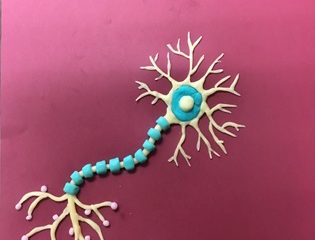Here are a few things I am reading today:
“When we’ve got a problem to solve, we don’t just use our brains but the rest of our bodies, too. The connection, as neurologists know, is not uni-directional. Now there’s evidence from cognitive psychology of the same fact. “Being able to use your body in problem solving alters the way you solve the problems,” says University of Wisconsin psychology professor Martha Alibali. “Body movements are one of the resources we bring to cognitive processes.”
“Long-term relationships make the commonly abused drug amphetamine less appealing, according to a new animal study in the June 1 issue of The Journal of Neuroscience. The findings suggest that social bonds formed during adulthood lead to changes in the brain that may protect against drug abuse.”
“Until now, scientists believed that only a couple of brain areas mediate facial recognition. However, Carnegie Mellon University’s Marlene Behrmann, David Plaut and Adrian Nestor have discovered that an entire network of cortical areas work together to identify faces. Published in the current issue of the Proceedings of the National Academy of Sciences (PNAS), their findings will change the future of neural visual perception research and allow scientists to use this discovery to develop targeted remedies for disorders such as face blindness.”
“Eve Van Cauter, PhD, professor in medicine and director of the study, found that men who slept less than five hours a night for one week in a laboratory had significantly lower levels of testosterone than when they had a full night’s sleep. Low testosterone has a host of negative consequences for young men, and not just in sexual behavior and reproduction. It is critical in building strength and muscle mass, and bone density.”
“Our Presentation: Reverse-Engineering Leadership: Deconstructing Perceptions of Personality in Generals and CEOs.
What do Mark Zuckerberg, CEO of Facebook, and retired U.S. Army General Stanley McChrystal have in common? A Q-sort technique was used to identify audience perceptions of personality characteristics of CEOs and generals, and results indicate more similarities than differences.”




5 Comments
docejvh · June 2, 2011 at 8:12 pm
I was very interested with what you said about PTSD in lecture today. I hesitated to bring it up, but I was never officially diagnosed but believe that I had mild symptoms of PTSD after my combat tour in Iraq. I never took any medications, but what actually helped me heal the most was writing poetry and confronting the darkness. It was a very cathartic experience, but it took me five years after I got back to even be able to really sit dow and start writing. On another note, having seen combat first hand with the Marine Corps infantry, I have to disagree with the idea of measuring recruits hippocampus to see if they would be fit for combat duty. Showing that a smaller hippocampus correlates to someone being more likely to suffer from PTSD shouldn’t exclude them from combat. There is an element of character that sometimes just can’t be explained scientifically, and if someone has the courage to go on the front line then they will most likely also have the courage to deal with PTSD as well. Just to look at someone’s brain and say they don’t have what it takes to serve in combat doesn’t consider the remarkable human elements of honor and courage.
corrieesmon · June 3, 2011 at 7:11 am
A Good relationship is a drug to me. I am much happier being in a strong relationship and I am proud to say in Oct. will be nine years then when I was out on the streets putting meth in me, and I am much healthier too.
The key ingredient though is a good healthy relationship. I was in much longer relationships but they were far from healthy, so I did more drugs.
The happiness I get from my relationship is my new drug of choice. Sometimes it is even better than chocolate, I said sometimes though.
Annadavis · June 3, 2011 at 3:16 pm
I agree with docejvh about the hippocampus recruiting topic. As fate would have it, I was pregnant when my unit was deployed to the gulf war (my daughter was born on Aug. 2, 1990).
Interestingly, when the troops returned and shared their stories, we were surprised to hear that some of the guys we all assumed would be the ”courageous ones” crumbled under the pressure and some of the more “meeker/gentler” guys stepped up to the plate in ways that weren’t expected by the personality and behaviors they had exhibited before they went to combat.
I too believe we all tap into else during such times and maybe ONLY during those times.
On a separate note, I downloaded the Dual N-Back game and I’m not doing very well! Seems I really need to exercise this ol’ brain of mine.
corrieesmon · June 4, 2011 at 7:58 am
So using your whole body to solve a problem could very well explain why it when I feel restricted in some the desk I sit at that I just am not able to first take in all the lecture, but come test time I am unable to do well. I have noticed when I am sitting in the more spacial chairs that have space in between the next student I am able to just concentrate more.
Laura Freberg · June 4, 2011 at 5:23 pm
I’m definitely not going to disagree with you about the hippocampus–PTSD thing, given your experience and expertise. I think the same holds true with NFL quarterbacks. We can advise, perhaps, but the individual should always have the last word.
Comments are closed.